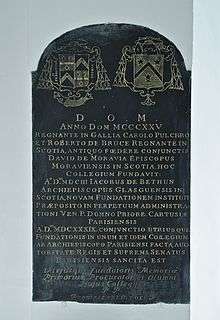David de Moravia
David de Moravia (died 1326) was Bishop of Moray during most of the First War of Scottish Independence. He was elected Bishop of Moray, probably in early 1299. Extended details exist regarding the election because of an extant letter of Pope Boniface VIII. The result of the election was that David had 13 votes, the Dean had 4 votes, the Chancellor had 3 votes and the Archdeacon 1 vote. The Dean declared that David was elected, and sent a request for confirmation to the Papacy. The latter found an irregularity, though what exactly this was not revealed. The election result was nominally declared void, but the Pope himself provided David directly to the bishopric.[1] He was consecrated as Bishop at Anagni in Italy on 28 June 1299, by Matthew of Aquasparta, Cardinal-Bishop of Porto.[2]
David de Moravia | |
|---|---|
| Bishop of Moray | |
| Church | Roman Catholic Church |
| See | Diocese of Moray |
| In office | 1299–1326 |
| Predecessor | Archibald |
| Successor | John de Pilmuir |
| Orders | |
| Consecration | 28 June 1299 at Anagni in Italy |
| Personal details | |
| Born | Prob. mid-13th century Probably Moray or Sutherland |
| Died | 6 January 1326 |
| Previous post | Canon of Elgin Cathedral |

In 1306, King Edward I of England charged Bishop David with complicity in the murder of John III Comyn, Lord of Badenoch. David was excommunicated and fled to the Earldom of Orkney. King Edward sent a request to King Haakon V of Norway for Bishop David to be arrested. David escaped capture. On 17 June 1320, the bishop was again excommunicated, by Pope John XXII, as an abettor of King Robert I of Scotland, enemy of King Edward II of England. On the orders of the Pope, the Bishop of Dunblane and the Bishop of Winchester delivered a sentence of excommunication on David and other bishops on 23 May 1322.[3] The excommunication was later withdrawn.[4]
Bishop David is particularly notable as the founder of the Scots College in Paris in 1325, by donating the land on which it was built. The foundation confirmed by Charles the Fair, King of the French, in August 1326. Bishop David, however, died before the College was formally instituted. He died on 6 January 1326, and was buried in the choir of Elgin Cathedral.[5]
Notes
- Dowden, Bishops, p. 151.
- Dowden, Bishops, p. 151; Watt, Fasti Ecclesiae, p. 215; Keith, Historical Catalogue, p. 140, states incorrectly that the consecration took place at Avignon.
- For all this, see Dowden, Bishops, p. 152.
- Dowden, S. 152.
- Keith, Historical Catalogue, p. 140; Watt, Fasti Ecclesiae, p. 215.
References
- Dowden, John, The Bishops of Scotland, ed. J. Maitland Thomson, (Glasgow, 1912)
- Keith, Robert, An Historical Catalogue of the Scottish Bishops: Down to the Year 1688, (London, 1924)
- Watt, D.E.R., Fasti Ecclesiae Scotinanae Medii Aevi ad annum 1638, 2nd Draft, (St Andrews, 1969)
| Religious titles | ||
|---|---|---|
| Preceded by Archibald |
Bishop of Moray 1299–1326 |
Succeeded by John de Pilmuir |